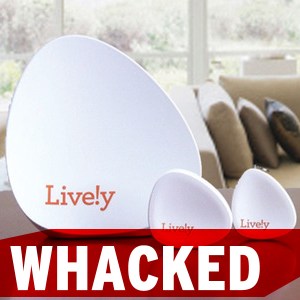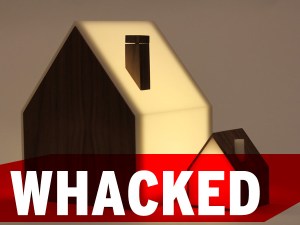Editor’s note: Ross Rubin is principal analyst at Reticle Research and blogs at Techspressive. Each column will look at crowdfunded products that have either met or missed their funding goals. Follow him on Twitter @rossrubin.
One of the hottest areas of tech right now is the Internet of Things, wherein everyday objects communicate with each other. As doorknobs and clothing learn to communicate, we can only hope that they will protect their language better than the humans who have seen English reduced to abbreviated gibberish in the face of texting and Twitter. If Kickstarter campaigns are any indication, though, objects have a lot to say without speaking at all.
 Whacked: Lively. As kids age into teenagers, parents often face the dilemma of balancing supervision and independence, a fine line that their children may increasingly find themselves karmically walking as those parents age. Placing security cameras around the home of an independent elderly parent seems too intrusive while relying on an emergency alert may provide critical indications too little too late. Lively strikes a great middle ground. In the tradition of Kickstarter-funded connected sensors such as Twine and Ninja Blocks, Lively makes use of vaguely cat ear-shaped sensors that serve as proxies for the fulfillment of routines when creatively deployed. These can indicate activities, such as eating meals, taking of medications and going outside. It’s sensors for seniors.
Whacked: Lively. As kids age into teenagers, parents often face the dilemma of balancing supervision and independence, a fine line that their children may increasingly find themselves karmically walking as those parents age. Placing security cameras around the home of an independent elderly parent seems too intrusive while relying on an emergency alert may provide critical indications too little too late. Lively strikes a great middle ground. In the tradition of Kickstarter-funded connected sensors such as Twine and Ninja Blocks, Lively makes use of vaguely cat ear-shaped sensors that serve as proxies for the fulfillment of routines when creatively deployed. These can indicate activities, such as eating meals, taking of medications and going outside. It’s sensors for seniors.
Lively isn’t just a one-way communique either. The offbeat part of the offering is a weekly printed LivelyGram that includes photos and updates from preselected loved ones. It’s somewhat like what was tried by the Presto printer, but without the local hardware (well, at least bulky, ink-consuming local hardware). Like the seniors it seeks to support, Lively is independent, relying on an integrated cellular signal like the original Kindle instead of a home network connection.
Lively raised less than $14,000 of its $100,000 goal, but little was ever at stake as the company had secured millions of dollars in funding prior to the Kickstarter campaign, which includes the confident phrase, “When we launch Lively…” And when they do, the basic set will go to $149 with a $20 per month fee, which includes a twice-monthly delivery of LivelyGrams.
 Whacked: Good Night Lamp The backers of Good Night Lamp would likely argue that a house is not a home without a house that is an Internet-enabled light source. Consisting of a basic set level of a bigger and smaller lamp, the lamp lets distant friends and relatives send subtle signals to each other; up to four little lamps can be connected to a master big lamp. Turning on the big house light turns on the smaller ones. It’s a bit like having your own personal blinking red phone like the kind that connects Commissioner Gordon to Batman or Presidents Obama and Putin without the threat of the Joker or nuclear apocalypse.
Whacked: Good Night Lamp The backers of Good Night Lamp would likely argue that a house is not a home without a house that is an Internet-enabled light source. Consisting of a basic set level of a bigger and smaller lamp, the lamp lets distant friends and relatives send subtle signals to each other; up to four little lamps can be connected to a master big lamp. Turning on the big house light turns on the smaller ones. It’s a bit like having your own personal blinking red phone like the kind that connects Commissioner Gordon to Batman or Presidents Obama and Putin without the threat of the Joker or nuclear apocalypse.
The Good Night Lamp had a large funding target of £360,000, of which only about £40,000 was collected, but the team refused to go gently into that good night. Publicity from the campaign led to much exposure for the team, which found an alternate route to production. Preorders at eponymous Good Night Lamp Shop began in February for £99 and are expected to start shipping in September.
 Whacked: TeleSound Not the most directly connected of Internet objects, TeleSound sought to be a small speaker closely resembling the speaker end of a classic desk phone handset connected via Bluetooth to an iPhone. Those with the appropriate companion app would be able to send sonic emoji to remote TeleSound devices via the recipient’s smartphone, promulgating the renaissance in flatulence simulations that we all miss from the golden age of fart apps.
Whacked: TeleSound Not the most directly connected of Internet objects, TeleSound sought to be a small speaker closely resembling the speaker end of a classic desk phone handset connected via Bluetooth to an iPhone. Those with the appropriate companion app would be able to send sonic emoji to remote TeleSound devices via the recipient’s smartphone, promulgating the renaissance in flatulence simulations that we all miss from the golden age of fart apps.
Unlike Lively or the Good Night Lamp, the TeleSound team packed it in after reaching less than $15,000 of its $100,000 goal. Rewards for non-backers apparently included a free guilt trip as TeleSound’s website sounds off, “[I]f you wanted TeleSound to happen, you should have backed the project. If enough of you and your friends did, we would have been able to make it.”
